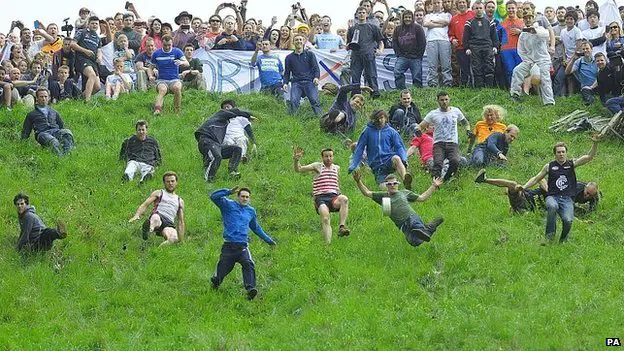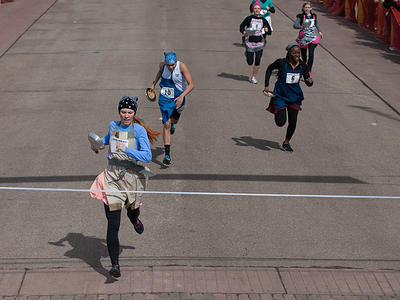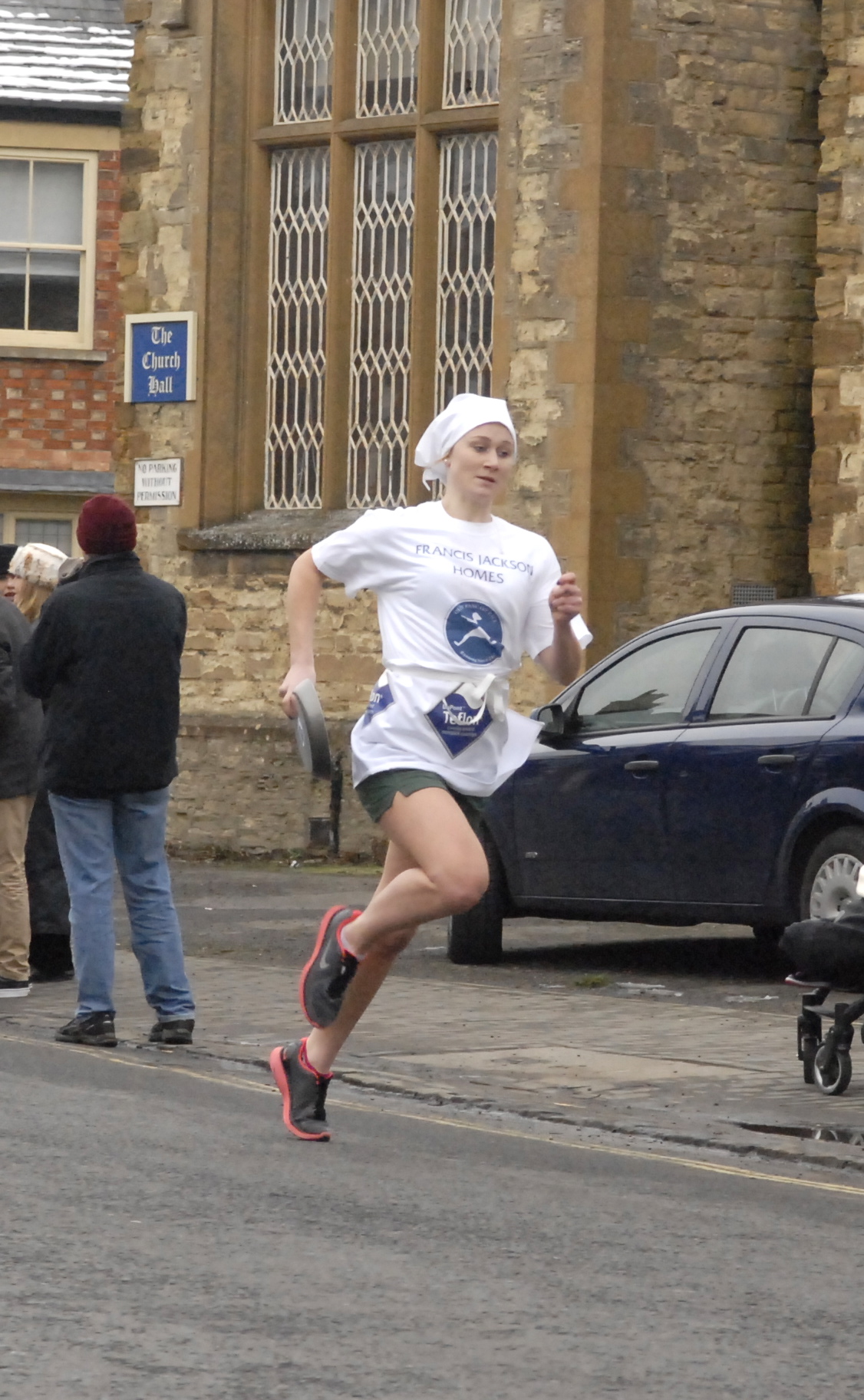Food races fill town and city squares around the world.
 One of the most notable food races is the Cooper's Hill Cheese-rolling and Wake, an annual event put on each May by the residents of Brockworth, a village near Gloucester, England. Participants nominally roll but effectively chase a 9-pound roll of Double Gloucester cheese down a steep hill. The cheese doesn't always roll straight down the 200-yard-long hill, so participants are often required to right the cheese and start it rolling again. The first pair of cheese and chaser across the finish line at the bottom line win the cheese-roller a prize, and the cheese.
One of the most notable food races is the Cooper's Hill Cheese-rolling and Wake, an annual event put on each May by the residents of Brockworth, a village near Gloucester, England. Participants nominally roll but effectively chase a 9-pound roll of Double Gloucester cheese down a steep hill. The cheese doesn't always roll straight down the 200-yard-long hill, so participants are often required to right the cheese and start it rolling again. The first pair of cheese and chaser across the finish line at the bottom line win the cheese-roller a prize, and the cheese.
Injuries have been a common part of the cheese-rolling event, and the event lost its sanction in 2009. The event has continued in an unofficial capacity since then, with a concession to safety since 2013 that the real cheese rolls be replaced with a foam replica.
Long a locals-only event, the Cooper's Hill Cheese-rolling is now open to all. Some internationals have won in recent years.
The cheese-rolling event dates to the 19th Century. During World War II, participants used wooden replicas because cheese was rationed.
Another such British event is the Stilton Cheese Rolling Championship, which takes place in Stilton, England. Participants roll a log of Stilton cheese along Stilton High Street, which is not nearly as steep as Cooper's Hill in Gloucester.
A similar cheese-rolling event takes place once a year in Whistler, British Columbia, Canada. The Canadian Cheese Rolling Festival occurs at Blackcomb Mountain Base 2. The dairy product on offer for the race is British Columbia's Courtenay Cheddar. This cheese-rolling event is a bit younger and less injury-punctuated than the Gloucester event.

 A slightly different food is the focus in the towns of Liberal, Kansas, and Olney, England, every Shrove Tuesday. This is the Great Pancake Race, an event that dates to the 15th Century.
A slightly different food is the focus in the towns of Liberal, Kansas, and Olney, England, every Shrove Tuesday. This is the Great Pancake Race, an event that dates to the 15th Century.
As the story goes, an Olney woman was cooking up a pancake in a skillet when she heard the village church bells ring, announcing the Shriving service. The woman, fearful of being late, dashed out of her home and to the church, still carrying the pan with the pancake in it.
Shrove Tuesday is a day of focus and reflection ahead of Ash Wednesday, an important day in the Christian calendar. The tradition of pancakes or the equivalent on Shrove Tuesday is an old one. The idea of Lent used to be that Christians observing a traditional "giving up" of something important to them would refrain from eating dairy products and foods full of sugar. So, to use up any existing milk and eggs and sugar, people commonly made a lot of pancakes and ate them. (Shrove Tuesday has also been called Pancake Tuesday. It coincides with Mardi Gras.)
Residents of modern-day Olney commemorate this event with a 415-yard-long pancake race each Shrove Tuesday. The race starts at 11:55 a.m., outside the Bull Inn. Participants wear a traditional apron and cap, to honor the "first flipper," and have to flip their pancakes once at the start and once at the finish, outside the Paris Church of St. Peter and St. Paul. It is not a straight-line course but an S-shape.
The winner gets a prize. So do the oldest participant and the runner who raises the most for charity.
The Olney race commemorates a date thought to have occurred in 1445. The race itself doesn't date quite that far back. However, it is not the only such race in existence.
The people of Liberal, Kansas, have gotten into the pancake-flipping act as well, challenging the Olney townsfolk to an annual rematch of a race that has been going for a few decades now.
The Liberal race is an identical distance, 415 yards. Liberal participants do the two-flip routine as well. Each Liberal winner's time is compared to the winning time of that year's Olney winner, and two-town champion is declared.
The Liberal race began in 1950, and the result is International Pancake Day, which incorporates the pancake race into an overall festival day in both places.
Not that they're keeping track, but the Liberal race winners have been faster than the Olney winners 36 times of the 62 races run. (One race's results were thrown out when the Olney race could not be completed because a BBC truck was blocking the finish line.)
The all-time fastest pancake race finish was in 56 seconds, by Devon Byrne of Olney, in 2014.